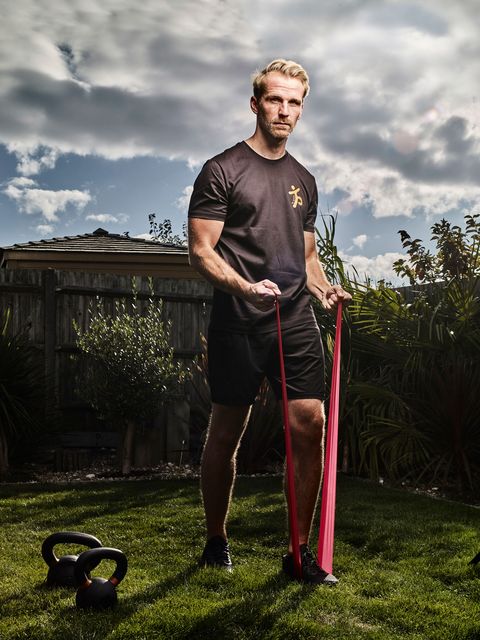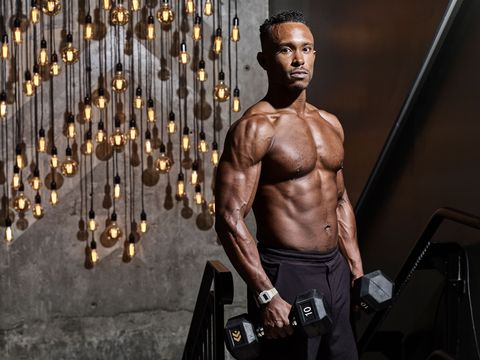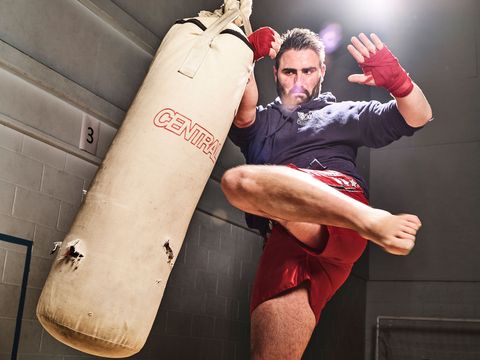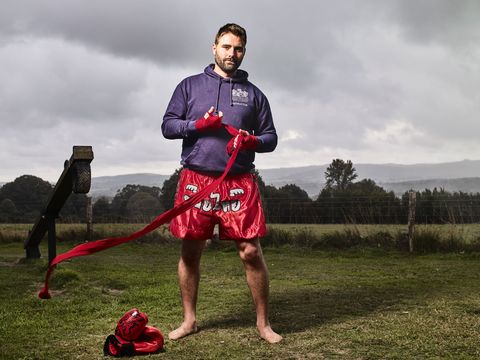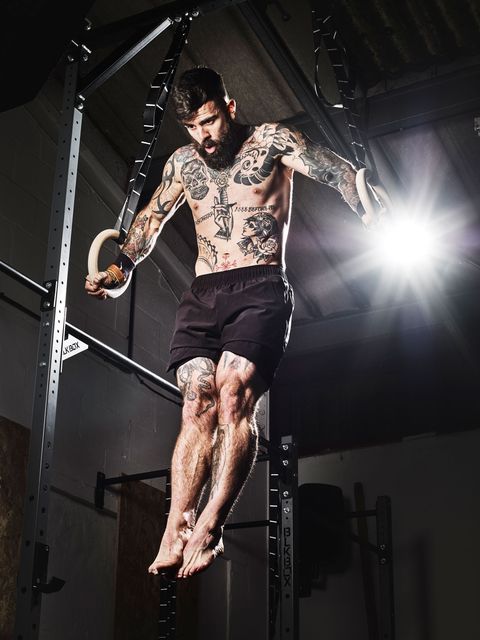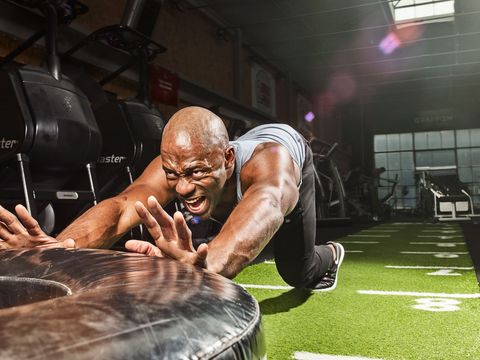Britain’s Best Coaches and Personal Trainers 2020
Those who aren’t locker-room regulars often assume that the fitness industry is populated by over-muscled meatheads, underfed models and wannabe wellness gurus. But those who have a gym they call home know that this couldn’t be further from the truth. Sure, you’ll probably cross paths with some of those stereotypes, but the world of health and fitness is also full of men and women transforming people’s lives for the better. There are those fighting to make fitness more inclusive; there are tireless charity fund-raisers; and there are trainers working overtime to provide information and accessible tools to those who can’t otherwise afford them.
Of course, none of this is news to you, the Men’s Health reader. That’s why almost 2,000 of you wrote in to tell us about the coaches who you felt deserved their place on this list. Here are this year’s winners.
This content is imported from YouTube. You may be able to find the same content in another format, or you may be able to find more information, at their web site.
The Lockdown Lifeline
When the pandemic forced vulnerable people to self-isolate, personal trainer Ty Paul urged them not to accept the situation lying down. Quite literally.
In the weeks after the coronavirus forced UK gyms to close, many enterprising trainers shifted their classes online. That’s easy enough if your clientele consists of digital natives with MacBook Pros, but a little harder when they’re retirees.
Inspired by the gains made by his PT clients (among whom is a swole septuagenarian), Paul decided to launch a fitness class for over-60s last year. It had occurred to him that most gym timetables catered almost exclusively to the young and limber. Even modest amounts of strength building can have a major impact on older people’s quality of life, yet seniors remained a neglected group.
His first class, held in a local church hall, attracted 65 people. “Its popularity blew me away,” he says. Paul scaled workouts to ensure that they were as accessible for a 90-year-old with mobility issues as for a squat-jumping 60-year-old. A representative from Age UK invited Paul to trial his classes in care homes.
Then the country went into lockdown. Community centres closed; care homes stopped admitting visitors. With most of his trainees considered high risk and faced with long-term isolation, Paul worried about the effect on their mental and physical health. “They needed my help more than ever,” he says.
First, he spent two days calling everyone who had attended one of his classes. Next, he drove to their homes, delivering disinfected resistance bands and a step-by-step guide to using Zoom. It worked. Not only were the lockdown sessions popular, they became a social hub. “People who’d never met before are now friends because of these Zoom classes,” he says.
Helping people chase short-term aesthetic goals isn’t something that excites Paul. He is part of a GP referral scheme, which offers free workouts to people with high BMIs; his ambition is to move into NHS aftercare, working with patients who are recovering from surgery or other issues. “It’s never been my thing to help people get in shape for Marbella,” he says. “Helping people to transform their lifestyles and rebuild their self-confidence is so much more rewarding.”
The Outspoken Activist
Viewing the pursuit of fitness as a force for change, Taofique Folarin raises awareness of mental health issues in the LGBT+ community.
Taofique Folarin took an atypical path into fitness instruction. A dancer and stage actor, he discovered a passion for coaching while playing Banzai the hyena in a production of The Lion King. His cumbersome costume required him to focus on strength and conditioning, and he found himself spending an increasing amount of time in the gym. On top of that, he would often perform Insanity HIIT workouts ahead of shows. Cast mates would stop to ask him what he was doing; soon, they started joining in. “I saw how much they loved it. That was the first time I felt the value of building a fitness community. Before that, I was training on my own,” he recalls.
Since obtaining his PT qualification, Folarin has worked across London’s boutiques – Barry’s, Blok, Frame, Sweat It – teaching everything from boxing to animal flow. But it’s the work he does away from the studio that inspires him most.
As a gay man, he had long wanted to champion causes that mattered to him. “I wanted to use my talents in a way that allowed me to give something back,” he says. So, he started to volunteer with Impulse London, a group dedicated to promoting sexual and mental well-being among gay men. The first event that he curated was a panel discussion, encouraging
HIV awareness within the BIPOC (Black, Indigenous and People of Colour) community.
In 2018, he hosted an event called Sweat and Smile: a free workout combined with a frank discussion about mental health. After a 50-minute session, attendees were invited to listen to a guest speaker talk about anxiety, depression and how exercise can help. “Then everybody who wanted to shared their own experiences,” says Folarin. “Some people brought friends who were suffering. We had a breakout room with a counsellor, in case anyone needed support.” He now runs similar events around his studio jobs, and his ambition is to host Sweat and Smile on a monthly basis in 2021.
The mental health conversation, much like the fitness industry, needs to feel accessible to be effective. “It doesn’t have to be drab and dark,” he explains. “That only adds to the stigma. It’s a part of life, and we can all suffer from it. If we can address it in a lighthearted way, all the better.”
The Black-Belt Mentor
As a troubled teenager, Giovanni Soffietto’s life was turned around by martial arts. Now, he’s using the skills that he has learned to fight society’s inequalities.
The first time he visited a martial arts gym, Giovanni Soffietto was 13 years old. “It was very rough and ready, the sort that wouldn’t meet today’s standards,” he says. “I went in with an ego and got my backside handed to me.” While others might have been put off by the experience, Soffietto was transformed and returned to train every day. By the age of 16, he was assisting the coaches.
Outside the gym, his life was hard. His mother was an alcoholic who left his father to raise Soffietto and his siblings alone, and his family had very little money. “I was incredibly angry,” he says. “But martial arts can tame aggression in a way that’s really constructive. I never had a fight at school after starting Thai boxing.”
On his 18th birthday, he took out an insurance policy to start teaching Thai boxing and karate but was confused by the absence of a reliable governing body for martial arts tutoring. So, he decided to create one: the British Martial Arts and Boxing Association (BMABA). To fund the project, Soffietto worked full time, taking night shifts so that he could be available during the day. By 2016, the BMABA was bringing in enough money to allow him to quit the night job.
As the company grew, he began thinking about the paper-thin line between his life and those of his friends, some of whom had ended up in prison. “I would have been sucked into that had my coach not been there. He inspired me to better myself,” he says. “A supportive coach who is there when parents can’t be and when schools are unable to help can make all the difference to young people’s lives.”
Through its charitable arm, the Fighting Chance Foundation, the BMABA now offers scholarships to those who display a talent for martial arts but can’t afford classes. Soffietto
has also led a number of youth engagement campaigns, such as #DitchTheBlade, which is focused on helping those living in deprived areas to redirect their frustrations into taekwondo, karate, MMA or muay Thai.
At present, Soffietto is busy coaching other coaches as part of a push to make martial arts training more inclusive for those with mental or physical disabilities. He’s not just fighting the good fight – he’s winning it.
The Cancer Battler
The co-founder of a fitness movement that raises funds for cancer, Scott Britton will go global in 2021 with a groundbreaking coaching initiative.
Statistically, we will all either have cancer or have someone close to us go through it at some point in our lives. In Scott Britton’s case, it was a family member. And so, while serving as a detective sergeant in the police, Britton started doing annual challenges to raise money for cancer charities. Realising that his energy would be better spent organising others, he and 11 friends deadlifted the weight of the Titanic over 12 hours. They pulled in £36,000.
With his friend Pete Williams, he then founded Battle Cancer to host fund-raising CrossFit competitions that were accessible to the everyday athlete. Britton and his wife, Freya, left their jobs at the end of 2019 to work on it full time – but a few months later, COVID-19 meant big events became impossible. So, he redirected his passion into Move Forward: a 12-week programme that turns cancer survivors into coaches, who then support other people in recovery.
Now, Battle Cancer and Move Forward are going global, offering free access to a social worker, a nutritionist, a fitness expert and peer support through the FITR app. The first Move Forward Gym is now open near Exeter.
“It’s the most rewarding thing I’ve ever done. My goal is to be raising £1m a year and have a worldwide network helping thousands of people to build their own communities.”
The Zero-Excuses Ninja
Despite his nickname, Tyler “the Ninja” Saunders isn’t one for posing or showboating. His mission is simple: to help others clear their everyday obstacles.
“Growing up, I was the only disabled person I knew,” says Saunders, who was born with one leg. As a kid, he enjoyed sports, but often struggled as a result of his impaired mobility. Until his early twenties, he wore a prosthetic. It was uncomfortable, but it made him less self-conscious. “Back then, I didn’t want to stand out,” he says. It was only when an ex-girlfriend challenged him on it that he made the switch to using crutches. “Eventually, I got over the idea that everyone was looking at me,” he says. “It became my identity: I was the one-legged guy who got around very easily.”
At 25, he took up wheelchair basketball, a sport in which he had dabbled as a teenager, but which hadn’t stuck. With its focus on upper-body fitness, it was a natural fit for Saunders. He was soon drafted into the Team GB development squad, then he joined a club in Germany. “For three years, I lived the athlete’s life,” he says. “Training and playing, I saw my body change.” When he returned, he knew that he could never go back to his old office job, so he applied for a PT qualification.
Initially, Saunders expected to work with other disabled people. But he found that his message of excellence against the odds – and the outright rejection of excuses – resonated with a broad audience. Now, the majority of his clients, as well as the bulk of his 25,000 Instagram followers, are non-disabled.
If you recognise Saunders, it’s likely from his turn on Ninja Warrior UK, a TV show on which high-level contestants complete a brutal obstacle course. “I thought I might as well try, even if it looked impossible,” he says. “It ended up being one of the best things I’ve done. It was scary, but every time I watch it again, it makes me proud.”
In taking these leaps, Saunders hasn’t just given visibility to disabled athletes: he has become a source of inspiration (and practical, no-nonsense advice) for anyone with mental barriers to get over. “Limitations are self-imposed. I’ve not let my situation define who I am. When I was younger, people with disabilities weren’t…
Sign up to the Men’s Health newsletter and kickstart your home body plan. Make positive steps to become healthier and mentally strong with all the best fitness, muscle-building and nutrition advice delivered to your inbox.
For effective home workouts, uplifting stories, easy recipes and advice you can trust, subscribe to Men’s Health UK.

